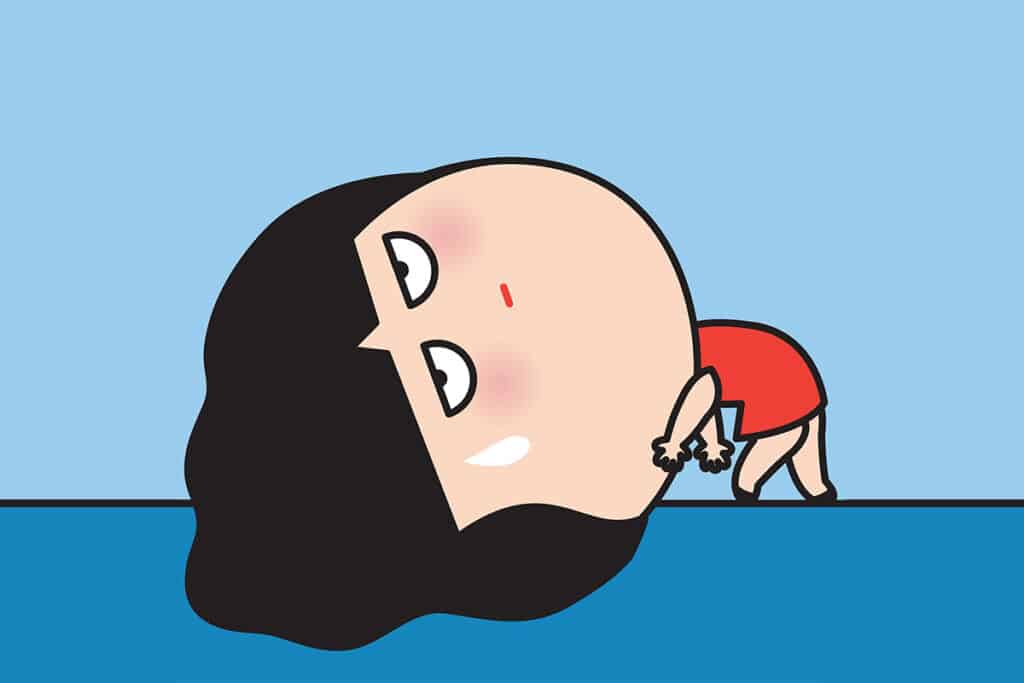
7 Shocking Facts About the Google Memory Game You Never Knew
We all have our favorite memory games, but did you know that Google has entered the ring with an impressive array of neurologic challenges for

“Why does my head feel heavy?” you might be asking yourself. There are several potential answers. It could simply be due to dehydration or fatigue, or it could be indicative of a more serious underlying health issue.
Dehydration and fatigue are two of the primary causes of a heavy head. Dehydration occurs when your body doesn’t have enough fluids to function properly, leading to symptoms like headaches, dizziness and even fainting. Fatigue can be brought on by many things such as sleep deprivation or stress – and just like dehydration it too can feel heavy in the head.
Other potential causes of a heavy head include:
– stroke
If you’re experiencing a heavy head, nausea, vomiting or difficulty speaking, this could be indicative of a stroke. As this is an emergency medical situation it is critical to call 911 immediately for assistance.
In most cases, a heavy head is nothing to worry about and can be easily treated. But if your symptoms are concerning or come along with other concerning signs, it’s always best to consult your doctor. They can diagnose what’s causing your discomfort and recommend the most suitable course of treatment.
We’ve all been there: you wake up in the morning, and it feels like your head is filled with lead. Despite your best efforts to shake it off, the feeling persists throughout your day. Why does this happen?
Your head could be feeling heavy for several reasons. Dehydration or lack of sleep could be to blame, or it could be indicative of a more serious condition like anemia or depression. Let’s explore some common explanations why your head might feel heavy.
Dehydration is often responsible for a heavy head feeling. Dehydrated bodies have to work overtime in order to stay functioning normally, leading to fatigue, headaches and an overall heavy sensation.
Dehydration can be a serious issue, so the best way to combat it is by drinking plenty of fluids throughout the day. Aim for eight glasses per day and increase this intake if you’re exercising or in a hot environment. Fruits and vegetables also contain water which should be included in your intake too; avoid diuretics like caffeine and alcohol which could actually worsen dehydration symptoms.
Nootropics like Iso Brain are completely caffeine free.
Another common cause of a heavy head sensation is sleep deprivation. Without enough shut-eye, your body cannot fully recover from the day’s activities; this can lead to fatigue, irritability and yes–that dreaded heavy head sensation!
If you’re struggling to get enough shut-eye, there are a few steps you can take. First, create an established sleep schedule and try your best to stick to it as much as possible. Second, create an enjoyable bedtime ritual that signals your body that it’s time for bed. Finally, ensure your sleeping environment is dark, quiet, and cool–all of which promote deep, restful sleep.
Anemia is a condition in which your blood doesn’t contain enough healthy red blood cells. Red blood cells carry oxygen throughout your body, so when they’re not doing their job correctly, you may feel tired, weak, and short of breath–as well as that familiar heavy head feeling.
Anemia can be caused by dietary deficiencies (like not getting enough iron), bleeding disorders (like ulcers), and certain chronic illnesses like kidney disease. If you suspect you might have anemia–or any other health issue–it’s essential to see a doctor so they can give an accurate diagnosis and create a personalized treatment plan tailored for you.
Depression may be one of the possible explanations for why your head feels heavy. Depressive feelings often involve feeling like you’re carrying around the weight of the world on your shoulders, losing interest in activities that used to bring you joy, having difficulty concentrating or sleeping more or less than usual – all of which can leave you feeling exhausted with that familiar heavy head sensation.
If you think you might be depressed, it’s important to seek professional help. A therapist can help you understand what’s going on and develop healthy coping mechanisms. Medication may also be necessary in some cases. Depression is a serious condition, but it’s also treatable. So, don’t hesitate to reach out for help if you need it.
There are a variety of possible explanations for why your head might feel heavy. In most cases, these issues are harmless and can be rectified with simple lifestyle adjustments like drinking more fluids or getting more sleep. On the other hand, a heavy head feeling could also indicate something more serious like anemia or depression; so if self-care measures don’t seem to help or you just don’t feel right, don’t hesitate to see a doctor for further evaluation and treatment options.
Let’s go over some other possible explanations.
Have you ever experienced the sensation that your head is twice its normal size when suffering from a sinus infection? It’s not just in your head; there’s actually an explanation for why this sensation arises. Let’s take a closer look at why this might be the case.
Four main sinuses exist in the head: frontal (in forehead), ethmoid (between eyes), sphenoid (behind eyes) and maxillary (behind cheekbones). All are connected and lined with mucous membranes.
When you have a sinus infection, that means one or more of your sinuses are inflamed. This inflammation is typically due to either a viral or bacterial infection and causes mucous membranes to swell. When this swelling leads to increased mucus production and can block off channels connecting your nose and throat to the sinuses.
Blockage in your sinuses causes pressure to build up inside of you, giving you that “heavy head” sensation. Inflammation and increased mucus production may also cause pain in your forehead, cheeks, or around your eyes; if it’s an especially severe infection you may also experience fever, fatigue, and tooth pain.
If you’re suffering from a sinus infection, know that you are not alone–this is an extremely common symptom. Most infections will clear up on their own within two weeks, but in the meantime there are ways to ease your symptoms such as taking over-the-counter pain relievers and using nasal sprays for nasal passage clearing. Stay positive–better days are ahead!
For centuries, people have sought to understand migraines: What causes them? Why do they seem to come out of nowhere and why do they cause such intense pain? While science still doesn’t have all the answers, science has made great strides in unraveling this puzzle. In this blog post, we’ll take a closer look at what migraines are, their causes and current treatments.
Migraines are a type of headache that can cause intense throbbing pain, nausea, vomiting and sensitivity to light and sound. They usually last anywhere from several hours up to several days and can be so debilitating that people often need to miss work or school due to them. While some individuals experience migraines frequently, others only occasionally, migraines have become an infrequent occurrence for them.
Migraines are thought to be caused by changes in the brainstem and its interaction with the trigeminal nerve, a large nerve that extends from the brain to the face. These changes release chemicals which cause inflammation and swelling of blood vessels within the brain – this causes headache-like pain, nausea, and other symptoms associated with migraines.
No single solution exists for migraines, but there are a variety of treatments that can help reduce their frequency and intensity. These include medication, lifestyle changes, and complementary therapies. If you suffer from migraines regularly, speak to your doctor about which treatments might be beneficial to you.
Migraines are a common headache that can cause intense pain and other symptoms. Although there is no one-size-fits-all cure for migraines, there are treatments available to lessen their frequency and impact. If you suffer from migraines, consult with your doctor about which options might work best for you.
Have you ever experienced the feeling of having a tension headache? If so, then you understand the sensation all too well: an intense, dull throbbing sensation in your temples that makes your head seem heavier than usual. But what exactly causes this heavy head sensation during a tension headache? Let’s explore its science behind it.
In short, tension headaches are caused by muscle contractions in the head and neck that can be due to stress, poor posture or eye strain. When these muscles contract, pressure is placed on blood vessels in these regions which then causes them to constrict, decreasing brain blood flow – thus leading to pain and heaviness sensations associated with tension headaches.
Contrary to popular belief, not all tension headaches are the same. There are two primary types of tension headaches: episodic and chronic. Episodic tension headaches tend to be less severe and occur less frequently than chronic headaches; on the other hand, chronic tension headaches tend to be more intense, occurring frequently (sometimes even daily).
Have you ever suffered from a tension headache? You know how debilitating they can be. Next time one of these headaches strikes, remember it’s likely caused by muscle contractions in your head and neck. And if these occur frequently for you, consult a doctor as it could be indicative of chronic tension headaches.
Have you ever experienced an ear infection and felt like your head was heavy? There’s a reason for that! In this blog post, we’ll take a closer look at why an ear infection might lead to such symptoms.
An ear infection occurs when there is inflammation in the middle ear, which is an air-filled space behind the eardrum that contains all of your tiny bones. The most common type of ear infection is called otitis media and usually results from either a viral or bacterial infection.
An ear infection can cause inflammation to block the Eustachian tubes, two small tubes running from the back of your nose to your middle ear. These assist with draining fluid from there and maintaining a constant pressure inside. When these are blocked, fluid accumulates inside and causes pain as well as a heavy feeling in your head.
An ear infection can make your head feel heavy due to inflammation and fluid build-up in the middle ear. If you suspect you may have one, see a doctor immediately so they can prescribe antibiotics or other medication to help clear up the infection.
A stroke occurs when the blood supply to part of your brain is interrupted or reduced. This could happen if a blood vessel bursts or becomes blocked by a clot. When this occurs, the affected area of the brain cannot receive enough oxygen and nutrients, leading to death.
One symptom of a stroke is a feeling of heavy head. This occurs because the part of your brain that controls how you perceive heavy sensations is located near where strokes typically occur, near where that area may have been damaged. When this area becomes damaged, people may no longer experience these feelings as if their head were full of lead or carrying around a bowling ball.
Strokes fall into two categories: hemorrhagic and ischemic. Hemorrhagic strokes occur when a blood vessel in your brain bursts, bleeding into brain tissue; while an ischemic stroke occurs when a clot blocks one of the arteries supplying oxygen-rich blood to your brain. Both types of strokes can damage the part of the brain that controls heavy sensations.
The symptoms of a stroke depend on which part of your brain has been damaged. If it damages the front part, you may experience difficulty understanding or speaking; whereas, damage to the back could leave you with trouble seeing. Furthermore, if one side of your brain is affected, then movement or control over that portion may be impaired.
If you experience any symptoms that could be indicative of a stroke, it’s essential to call 911 right away and get to the hospital promptly. The sooner you receive medical care for a stroke, the higher your chances are of making a full recovery.
Finally, here are a few possible causes of feeling like your head may be heavy:
There could be many causes of a heavy head. It could be due to a sinus infection, migraine, tension headache, ear infection or stroke – each with their own distinct symptoms but all sharing one common trait: an uncomfortable feeling in your head.
A sinus infection is typically accompanied by other symptoms like facial pain, nasal congestion and a runny nose.
Migraines can cause intense headaches, nausea, and sensitivity to light and sound.
Tension headaches are typically the result of muscle tension in the neck and shoulders.
Ear infections can cause pain, pressure and fullness in the ear.
A stroke may cause sudden weakness or paralysis on one side of the body, difficulty speaking or understanding words, and changes to vision.
First and foremost, dehydration could be to blame. If your body isn’t getting enough fluids, you may experience feelings of bloating and heavyness in your legs.
Second, you may be experiencing symptoms of sinus pressure or congestion. When your sinuses become inflamed, they can put strain on nearby tissues and cause pain and discomfort.
Third, your head may feel heavy due to muscle tension or stress. When we’re under duress, our bodies’ muscles can tighten up, leading to headaches and neck pain.
Finally, it could be that you simply aren’t getting enough sleep. Not getting enough zzz’s can lead to fatigue and make your head feel heavy and sluggish.
If you’re feeling unwell, reach out to your doctor. They can rule out any underlying medical conditions and create a plan that will help alleviate the discomfort.

We all have our favorite memory games, but did you know that Google has entered the ring with an impressive array of neurologic challenges for

Einstein’s Universal Appeal: Exploring the Global Impact of an Iconic Genius in 2023 Why Does the World Remember Einstein as a World Citizen? What is

I genuinely dislike computer science, but that won’t stop me from earning my degree by 2023. It’s no secret that computer science classes can be

In the early days of Instagram, getting verified was considered a sign of honor. That little blue checkmark next to your name indicated you were
† These statements have not been evaluated by the FDA. This product is not intended to diagnose, treat, cure, or prevent any disease.